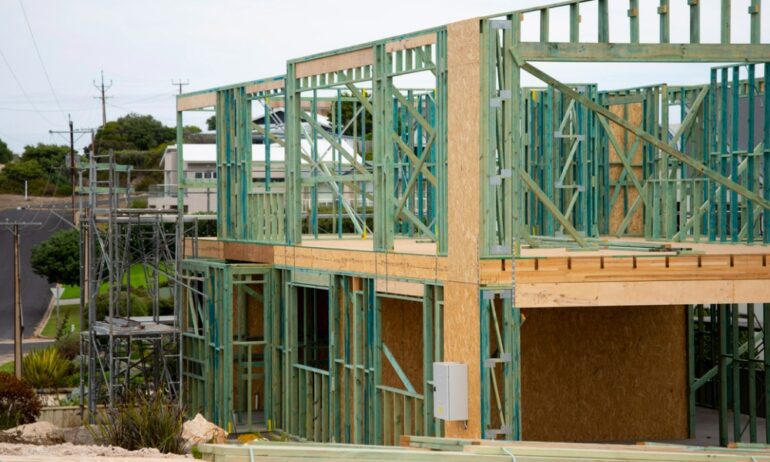TL;DR:
- NSW councils are turning to artificial intelligence (AI) to address delays in development approvals.
- The NSW government’s $5.6 million AI program aims to reduce lengthy approval timeframes.
- The average determination time for development applications has increased from 83 to 107 days in recent years.
- Inner-city councils like Georges River and Liverpool face waiting times exceeding 195 days.
- Builders report year-long delays, hindering new home construction and increasing costs.
- AI technology is seen as crucial for meeting housing supply needs and improving efficiency.
- AI tools will be used to review applications and enhance their quality before reaching town planners.
- The program has garnered interest from various councils, including Wagga Wagga City Council.
- Manuel Donebus, a developer, highlights the detrimental impact of delays on large projects.
- The NSW government aims to increase Wagga Wagga’s population but faces challenges due to slow development.
- The use of AI in development approvals has the potential to transform the construction market in NSW.
Main AI News:
In the realm of construction and urban development, time is often of the essence, and delays can be a significant obstacle. Councils across New South Wales (NSW) are now looking to harness the power of artificial intelligence (AI) to combat the growing backlog of development applications, which have been causing frustration among stakeholders.
The NSW government has introduced a groundbreaking program that offers town planners access to cutting-edge AI tools, a move that has generated considerable interest in the field. This initiative comes at a critical juncture for the state, which is struggling to meet housing targets due to the prolonged approval process.
Data from the state government has revealed a disconcerting trend, with the average time for determining a development application soaring from 83 days in the 2021/22 fiscal year to a staggering 107 days in 2023/24. Inner-city councils like Georges River and Liverpool, as well as regional areas like Bowral and Queanbeyan, have witnessed waiting times extending beyond 195 days. Such delays have led builders to report year-long setbacks on individual projects, thereby impeding the timely delivery of new homes and increasing costs.
At a recent Property Council event, NSW Planning Minister Paul Scully was confronted with the stark reality of a “zero percent” chance of meeting housing supply needs unless the government and the construction sector promptly embrace AI technology.
The NSW Department of Planning has introduced a $5.6 million AI program with the potential to revolutionize the development process and drastically reduce approval timeframes. While specific details regarding the program’s implementation remain undisclosed, a similar pilot initiative by the state government employed AI to swiftly review applications and identify discrepancies with planning guidelines.
A department spokesperson emphasized that the program aims to alleviate the burden on town planners by offering purpose-built AI solutions ready for deployment. Furthermore, AI will play a pivotal role in enhancing the quality of submitted applications before they even reach the desks of town planners.
“Councils have shown a keen interest in early department-led workshops,” the spokesperson stated.
‘Game Changer’ for Regional Cities
Wagga Wagga City Council is among the local governing bodies keen to participate in this transformative endeavor, as they fear an impending slowdown in residential construction in their area. Richard Foley, a local councillor, expressed concerns about dwindling land releases and the urgency of promoting urban development. He cited instances where residents in Wagga Wagga had to wait months for permission to build sheds or signs, with approval for larger projects taking up to six months.
“Some delays are absurd and need to be prevented,” Cr Foley emphasized.
Projects Collapsing Due to Delays
Manuel Donebus, the director of Damasa Pty Ltd, a development firm overseeing major commercial projects in Wagga Wagga, lamented the frustrating delays in receiving determinations. These delays have resulted in the collapse of several large projects, putting the company’s viability at risk.
“A lot of the time, it can make or break a project,” Mr. Donebus stressed.
The NSW government’s goal is to increase Wagga Wagga’s population from 67,000 to 100,000 by 2038. However, the latest census data indicates that the city is falling far short of this target. Mr. Donebus expressed his frustration at witnessing the city’s growth being hindered by the sluggish development process.
“We’re all working toward the same goal, but I don’t think we’re always on the same page,” he lamented.
The NSW government has conducted workshops on the new AI program with nearly half of the state’s councils and expects to commence hearing proposals in February. This innovative approach to expediting development approvals has the potential to reshape the construction landscape in New South Wales, offering a glimmer of hope for stakeholders grappling with mounting delays.
Conclusion:
The introduction of AI into the development approvals process in NSW signifies a critical step forward in addressing the growing backlog of applications and lengthy approval times. This innovative approach has the potential to significantly impact the construction and real estate market by streamlining processes, reducing delays, and encouraging urban development, ultimately contributing to the region’s economic growth and housing supply.

